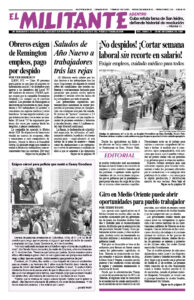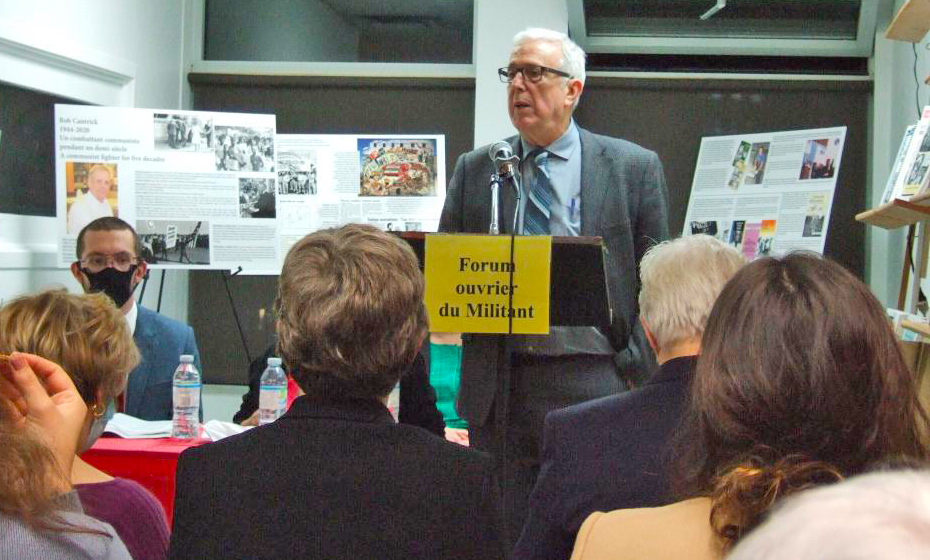MONTREAL — Thirty-two people attended a Dec. 5 celebration here of the political life of Bob Cantrick, a member and supporter of the communist movement in three countries for more than 50 years. Participants came from Toronto, Hamilton and Montreal. Cantrick died Nov. 4 in Toronto from complications resulting from his treatment for throat cancer. He was 76.
“Bob dedicated himself to living a life centered on advancing the fight for a world where exploitation and oppression of every kind is ended,” Steve Penner, organizer of the Communist League in Canada, told participants.
Communist League member Philippe Tessier and Montreal supporter Sylvie Charbin co-chaired the meeting. Over 20 messages displayed in binders for participants to read were sent from the U.S., Canada, Australia and New Zealand.
“Bob was won to the communist movement in the late 1960s under the impact of some of the most important struggles of the past six decades, in particular the Black rights, women’s liberation and anti-Vietnam War movements,” explained Penner. “And above all the Cuban Revolution, which points the way toward humanity’s socialist future.”
In 1967 Cantrick joined the Young Socialist Alliance, the youth group of the Socialist Workers Party, at Indiana University in Bloomington. He was active in the movement against the Vietnam War and in defense of GIs United Against the War, a group of U.S. Army soldiers who spoke out and faced victimization by the army brass. He joined the SWP in 1970 and became a member of its Chicago branch.
In his message to the meeting, Steve Clark, a National Committee member of the SWP, said he first met Cantrick in Chicago as a new member of the YSA. Clark described how Cantrick understood the importance of educating and helping to integrate new members like himself into the party. “Bob quickly took me under his wing politically,” said Clark, recommending books to read and study. “It takes care and political attention to work with contacts and new members. In whatever he did, Bob gave the task political attention. And he cared.”
Penner explained that beginning in 1978 the communist movement in the U.S., Canada and elsewhere “began an historic turn to place the overwhelming majority of its members in industry, to carry out union and political work alongside other workers in auto plants, steel mills, rail yards, coal mines, garment shops, packinghouses and other industrial workplaces.”
The goal of the “turn” was for the party to become “an inseparable part of the trade unions and their struggles,” said Penner, quoting from SWP National Secretary Jack Barnes’ introduction to The Turn to Industry: Forging a Proletarian Party.
Charbin and Tessier each described union battles they had participated in as a result of the turn. Charbin, a garment worker in 2001, recounted the successful strikes of thousands of Montreal garment workers that she and other League members were part of in 1986-87 and 2001.
Tessier, a Teamsters union picket captain during last November’s eight-day “strike for safety” by Canadian National rail conductors, told how the determination and unity of the rail workers pushed back concession demands of the bosses, who “never thought we would go on strike, much less that we would win.”
“Bob worked in a number of industries, including auto, steel and garment,” Penner said.
Three large panels were on display at the meeting, chronicling Cantrick’s political life.
One had a map showing the many cities in which he lived, worked and practiced revolutionary politics.
“Thanks to his mastering of the German language, Bob was asked to be part of the editing team in New York in the 1980s that produced the Pathfinder book series The Communist International in Lenin’s Time,” said Tessier. Cantrick assured the accuracy and quality of the documents by comparing the original German to the translations.
That series makes available the programmatic continuity of the worldwide communist movement led by V.I. Lenin and the Bolsheviks following the 1917 Russian Revolution.
In 1995 Cantrick and his companion Joanne Pritchard moved to Canada where they helped build the Communist League in both Montreal and Toronto.
In the early 2000s Cantrick became an organized supporter of the communist movement. For the past 20 years, up to just weeks before his death, he was a proofreader in the Print Project, an effort by over 240 supporters worldwide who work together helping design, produce and distribute Pathfinder books.
Language skills key to accuracy
“Bob Cantrick was passionate about words, grammar, proper punctuation and making Pathfinder books perfect,” wrote Ruth Nebbia from Virginia, who worked with Cantrick on a proofreading team.
This was in keeping with Pathfinder’s proletarian standards, Susie Berman, a supporter of the League from Toronto, said in her remarks, referring to a quote by SWP leader and president of Pathfinder Press, Mary-Alice Waters, in the pamphlet Pathfinder Was Born with the October Revolution. Waters said communists “consider this to be a class question. If it is to prepare itself to be the ruling class, the working class must have access to truth, to culture, to clearly presented, accurate information.”
In his message, Pathfinder editorial volunteer Martín Koppel said, “Bob made a significant contribution to the new Pathfinder edition of The Jewish Question: A Marxist Interpretation by Abram Leon. He worked with enthusiasm on the extensive footnotes and bibliography, much of it in German, checking every detail from the accuracy of historical names, dates and book titles to punctuation and spelling.”
Several messages commented on Cantrick’s wide range of interests and skills — from music and tennis to his proficiency as a magician. The quality of meals he and Pritchard served for those they hosted in Toronto was noted in several messages.
“This was a great event,” Walmart worker Yvan Mouyokono told the Militant. “I learned that Bob was a real fighter. He showed that you have to fight not just for yourself, but with others to change society as a whole.”
Following an appeal, the participants donated 1,494 Canadian dollars ($1,170) in a special collection taken to strengthen the work of the Communist League.



